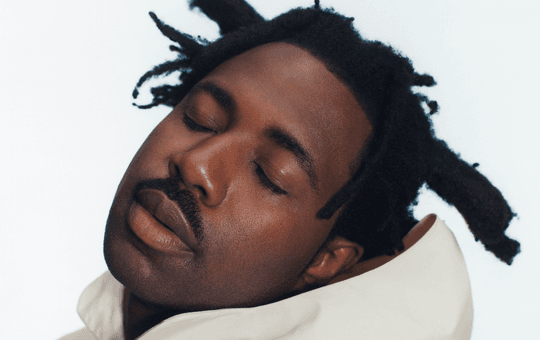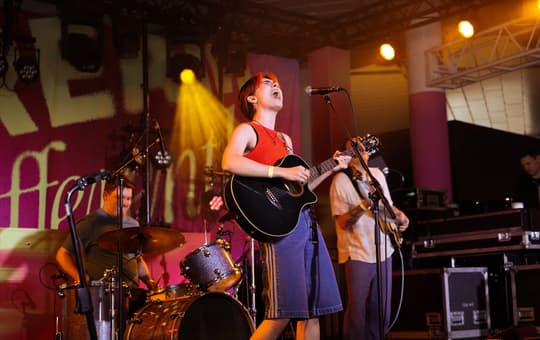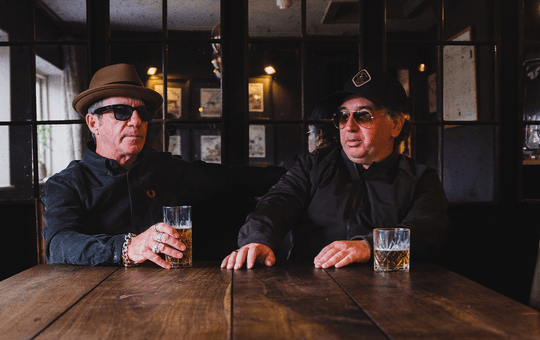Carl Craig interview: "In order to go forward."
“Carl Craig is here!” exclaimed the techno legend via Skype at the start of our interview. Given his fondness for alter ego, it felt like a little joke, aware of the breadth of all that which falls under the wide umbrella of Carl Craig’s business.
After resolving awkward Skype sound issues, he gave an impromptu performance, percussively tapping his hands against the desk, causing the signal to peak and distort. The 42-year-old Gemini and father was on family vacation in Geneva; bizarre sounds emanated from an iPad game in the background.
2011 is the 20th anniversary of Craig’s label, Planet E Communications and to celebrate, the label released a burner compilation, ’20 Fucking Years of Planet E: We Ain’t Dead Yet’ in April, and Craig is adopting one of his earliest pseudonyms, 69, for a spree of shows around the world. It makes sense, given that 69’s ‘Four Jazz Funk Classics’ was the first release on the label; it makes even more sense, given that the eclectic sound of 69 is indicative of Craig’s ceaseless curiosity, foreshadowing the diverse directions Craig’s music would explore over the next 20 years.
As a second-generation Detroit techno artist, Craig grew up playing guitar and absorbing the then already popular music of the Belleville Three (Juan Atkins, Kevin Saunderson and Derrick May) in the 80s, eventually getting his hands wet with a sequencer and a four-track and releasing under the pseudonyms BFC and Psyche for May’s Transmat label in 1990.
1990 was also the year Craig toured the UK, during which time he became intimately familiar with rave music, and its particular take on the breakbeat (Craig would later cite the London duo Shut Up And Dance as inspirational). The influence of the UK is undeniable in Craig’s music – there’s a grittiness, bluntness and ambient finesse from rave music that Craig incorporated into his style, and many argue that his 1992 Innerzone Orchestra track Bug in The Bassbin, a space-funk cruiser with 2-bar breakbeat-couplets, was in direct correlation with the evolution of drum and bass at the time. In addition to UK hardcore, Craig also found himself inspired by UK acts such as post-punk band Cabaret Voltaire and experimental stalwarts Throbbing Gristle (the very inspiration for the naming of 1991’s Four Jazz Funk Classics).
1991 was the beginning of Planet E, and from there Craig has ceaselessly explored his own music, with releases of various styles under different monikers including but not limited to 69, BFC, Psyche, Tres Demented, Innerzone Orchestra, No Boundaries, Paperclip People, C2, Eich and Designer Music. Over the years he’s collaborated with Moritz von Oswald, Marcus Belgrave, Herbie Hancock, Francesco Tristano and many more, exploring live electroacoustic renditions of his music in the worlds of both jazz and classical music. He’s toured the world many times over, and he’s released consistently compelling music on Planet E over the past 20 years. It doesn’t seem like Craig’s output or curiosity is slowing down any time soon.
In light of Craig’s upcoming 69 performance at Field Day, he spoke with me about the 69 shows, Planet E’s 20 year anniversary, past inspirations and gear.
[Carl Craig taps his fingers percussively]
Holy shit, a private performance from Carl Craig, thank you so much.
Carl Craig: I wish my wife got as excited about it [laughs].
So what brings you to Geneva?
Carl Craig: We’re on a two week family vacation.
Great. So this is the first year you’ve ever performed as 69? Why are you performing as 69 in particular?
Carl Craig: Yes. 69 was the start of Planet E – ‘Four Jazz Funk Classics’ was the first release, so it makes sense to do these performances as part of ’20 Years of Planet E’. The first performance was at the Movement Festival this year [in Detroit], then in Frankfurt, later at Wire Festival in Japan.
You have spoken about the fact that your first 69 release, ‘Four Jazz Funk Classics’, is indebted to the work of Throbbing Gristle. What was it about Throbbing Gristle’s music that inspired you as 69? Do you perceive specific spiritual overlaps existing between avant garde and rhythm and/or soul orientated music?
Carl Craig: With most of the music that I’ve done, I’ve borrowed titles from songs or artists that I really liked. For instance, Crackdown was a title from Cabaret Voltaire, No More Words after a Yello record, Four Jazz Funk Classics after Throbbing Gristle. With ‘Four Jazz Funk Classics’ there was a shout-out to Miles Davis because he had just died a couple months before the record came out, while I was making the record. There’s always this homage I pay to artists and groups that inspired my early days that still keep inspiring me. I like looking back in order to go forward.
In addition to 69, you’ve also released or performed music as BFC, Psyche, C2, No Boundaries, Paperclip People, Tres Demented and Innerzone Orchestra. Is there a particular purpose or importance of releasing under various pseudonyms for you? Is there a difference in between music you release under pseudonyms and under your real name?
Carl Craig: The monikers that I’ve used have always had their own personalities and concepts…inevitably it was just fun doing it, and it gives a bigger image to a one man show as well (laughs). Definitely the Carl Craig stuff is I’d say the most different than all the other stuff because I see it as being more like a new, ambient, avant garde concept that comes directly from being how Carl Craig is. When I do 69 I could put a face on 69 and do something different, but Carl Craig is the same guy you meet and shake hands with.
At Les [from Carl Craig’s 1996 album ‘More Songs about Food and Revolutionary Art’] is one of my favorite tracks of all time.
Carl Craig: Thank you, At Les is a song that has gone through time, it has held its own. It is one of those pieces where the instrumentation could change but you know it’s there.
I recently saw a YouTube clip of Versus performing At Les. Could you talk a little about this project?
Carl Craig: Versus was a performance of symphonic versions of music I’d written. Francesco Tristiano, who is a wonderful pianist as well as visionary, took my pieces and arranged them for orchestra, which is something that I’ve always wanted to do but I’m not an arranger. I don’t know how to arrange a part I’d made for flutes, where flautists can actually read it.
To have actual flautists playing flute tunes.
Carl Craig: You know, when you play a flute sample, versus an actual flute, there’s another way of dealing with it. You can play a synth sound, it is what it is, you can add an effect to it but if you wanted to write that effect, I wouldn’t know how to do it.
One of the reasons why your music is so powerful is because it crosses this intersection between the inhuman, with mechanical and futuristic sounds, and the extremely human, with full sensuality and soul. When you are making music, do you find that it starts with one or the other, or is it always in tandem?
Carl Craig: Whether it’s the synthetic feeling or the human feeling, it comes in actual composition. As I’m making something, a bassline, a rhythm that I really like, if I add some new rhythm on top, many times I’m playing through the track and improvising in the same way as if I had Marcus Belgrave, or Wendell Harrison, or Craig Taborn or Francesco Tristano…it’s the same as what I would expect from having another person playing an instrument that is their specific instrument. I’m always adding another thing, whether it’s someone else or myself, and it’s important to always have that human feeling in order to inspire myself. It’s a situation where you sit there with an 808, kind of program drums and do things, add changes and if you can do it fast it can work quite well, but there’s a rigidness that’ll stay there. The unrigid only comes if you can change the sequences as you go.
One-man-band style.
Carl Craig: Yeah I guess but I’m a Gemini, so I’m always two or more people!
If you don’t mind sharing, what is your favorite drum machine or favorite synthesizer?
Carl Craig: The most timeless drum machine is the 808. It’s a synth and can always be manipulated, whether with filter or delay or whatever, it can sound like an 808 but you can freak it out a lot more. The 909 sounds like a 909 always. We used the 808 in the late 80s and early 90s, Bambaataa in the early 80s, house guys in the 80s and 90s, always been in hip hop…there’s not another drum machine that has that legacy. You take a Linndrum and it sounds like…
Scritti Politti?
Carl Craig: It sounds like so many groups of the time, something like Love and Rockets). You hear that sound in ‘Thriller’; and then the Linn 9000 and Oberheim DMX all over Prince’s records; the CR78, always gonna sound like In The Air Tonight by Phil Collins. But with the 808, you can still use every sound and it’s a great machine.
As far as synthesizers are concerned, there’s no polyphonic keyboard that I think is the greatest. Honestly for me it’s either the [Roland] SH-101 or a [Sequential Circuits] Pro One.
What was the one thing (or the few things) that made you decide, That’s it, I want to be a producer?
Carl Craig: When I started playing guitar, that was the origin for my love of music, but when I was actually able to compose with a sequencer, I realized I could make records. I think the sequencer and four-track were the two pieces that, if they weren’t around, I wouldn’t have been able to make records. The sequencer made it possible that I could make ideas, and those ideas could come together and sound polished, and the four-track was being able to take multiple ideas and layer them. When I played guitar I didn’t think I was a good guitarist, and I’d always been more interested in the sounds of synths, but I wasn’t a virtuoso on the keyboard.
Your music and that of your peers has clearly inspired producers worldwide. Do you notice your own sounds being referenced by younger producers? What do you think it is about your music that draws other musicians to it?
Carl Craig: Definitely. I think it has mostly to do with the emotion I put into the music.
And finally, who are some current Detroit artists you’re excited about?
Carl Craig: Kyle is the youngest, he’s doing very well, Kyle Hall. On Planet E we have Reference, Oliverwho Factory, also there’s Urban Tribe who’ve been working with for a long time. He’s a good cat, Sherard Ingram, innovative producer.
Catch Carl Craig in a rare 69 live performance at Field Day this Saturday 6th April, plus check Carl’s website for full tour dates













